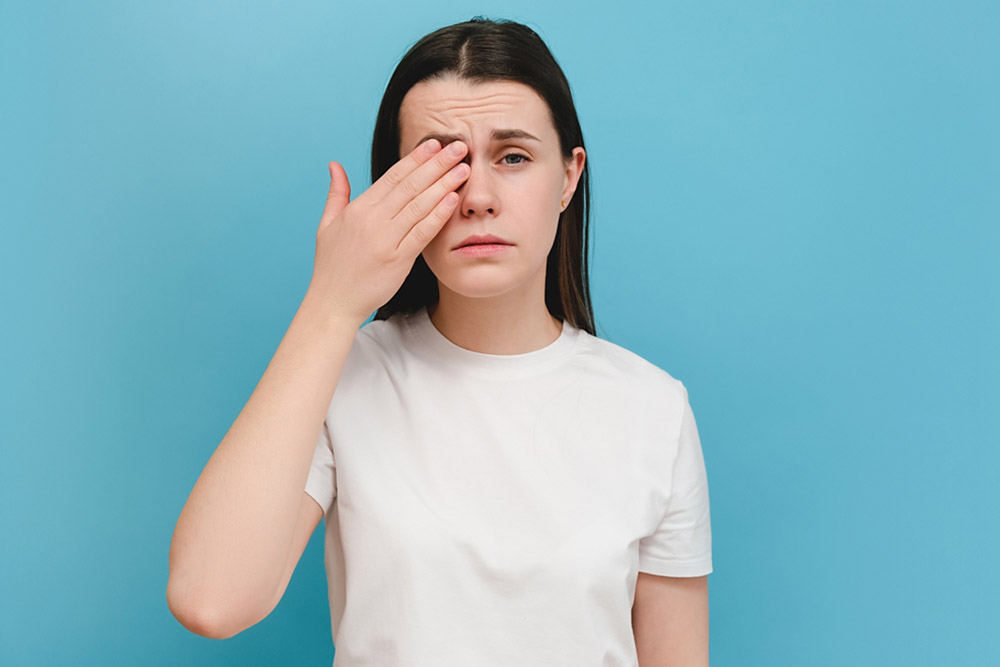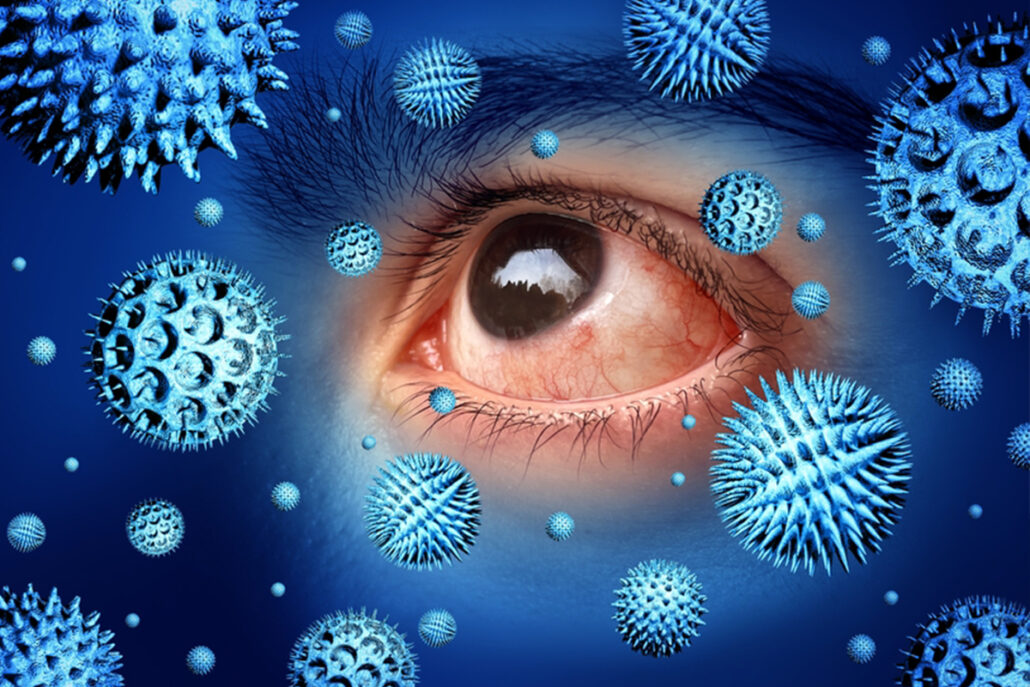The spring and summer months can bring pollen, ragweed, and other allergens into the air that can cause uncomfortable symptoms such as itchy eyes, sneezing, and more. If you’ve experienced these symptoms recently, you may be suffering from allergic conjunctivitis – a type of eye infection caused by airborne allergens. In this blog post, we’ll discuss the common allergens that can trigger allergic conjunctivitis so you can take control of your health this allergy season and get longer-lasting relief.

Understanding Allergic Conjunctivitis Causes
Allergic conjunctivitis, a common eye condition, is often triggered by an allergic reaction to airborne allergens. This inflammatory response occurs when the body’s immune system reacts to foreign substances, such as pollen, animal dander, or dust mites. People with allergic conjunctivitis may experience a range of symptoms, including itchy, red eyes, and a watery discharge.
Overview of Allergic Conjunctivitis for Affected Individuals
For those suffering from allergic conjunctivitis, understanding the condition is crucial. It’s characterized by an inflammation of the conjunctiva, the outer lining of the eye, often leading to discomfort and sensitivity to light. Common symptoms include redness, itching, and mucous discharge, often accompanied by nasal symptoms indicative of environmental allergies.
Common Allergens Triggering Allergic Conjunctivitis
Pollen: A Prevalent Allergen
Pollen, especially during the high pollen seasons of spring and summer, is a major contributor to allergic conjunctivitis. Pollen from trees, grasses, and weeds can cause significant discomfort for those with sensitivities. Tree pollen, in particular, can be highly irritating, leading to symptoms like itchy and watery eyes. During periods of high pollen counts, individuals with seasonal allergies may experience exacerbated symptoms.
Pet Dander and Allergic Conjunctivitis
Pet dander, such as cat dander and dog dander, is a significant indoor allergen. It can cause an allergic reaction in sensitive individuals, leading to conjunctivitis symptoms. Even homes without pets can have pet dander, as it can be carried on clothing and brought indoors.
Dust Mites as a Trigger for Conjunctivitis
Dust mites, tiny creatures living in household dust, feed on dead skin cells and thrive in warm, humid environments. They are a common cause of indoor allergic reactions, including allergic conjunctivitis. Regular cleaning and use of dust mite-proof covers on bedding can help reduce exposure.
Mold Spores and Eye Irritation
Mold spores, which are present both indoors and outdoors, can trigger allergic reactions when inhaled. They thrive in damp areas and can be found in basements, bathrooms, and kitchens, as well as in outdoor environments with high humidity. Reducing indoor humidity and fixing leaks can help control mold growth.
Seasonal Allergens: Specific Pollen Types
Different seasons bring different types of pollen. For example, tree pollen is more common in the spring, grass pollen in the late spring and summer, and weed pollen in the late summer and fall. Understanding which pollen types are prevalent in each season can help individuals anticipate and manage their allergy symptoms.
Airborne Allergens and Environmental Factors
Apart from the aforementioned allergens, other airborne substances such as smoke, pollution, and chemical fumes can also exacerbate allergic conjunctivitis. Environmental factors like wind can increase exposure to allergens by stirring up pollen and dust, making symptoms worse for those with eye allergies.

What Causes Allergic Conjunctivitis: Indoor vs Outdoor Allergens
Indoor Allergens: Household Contributors
Indoor allergens such as dust mites, cat dander, and mold spores are prevalent year-round but can be more problematic during the winter months when homes are sealed against the cold. Regular cleaning, using air purifiers, and washing bed linens in hot water can help reduce these allergens.
Outdoor Allergens: Environmental Factors
Outdoor allergens, like pollen from trees, grass pollen, and weed pollen, are more seasonal. Allergy sufferers may find their symptoms worse during certain times of the year, corresponding with the blooming cycles of different plants.
Identifying Personal Allergic Conjunctivitis Triggers
Understanding and identifying personal triggers is a key step in managing allergic conjunctivitis effectively. This section delves into how individuals can recognize and pinpoint specific allergens that exacerbate their condition.
Recognizing Symptom Patterns
Keeping a detailed diary of symptoms can be invaluable. Note when symptoms occur and their severity, along with any potential allergen exposures like being around pets, during high pollen seasons, or after dusting the house. Patterns may emerge, such as symptoms flaring up during the spring indicating a possible reaction to tree pollen, or getting worse after cleaning, suggesting a sensitivity to dust mites.
Professional Allergen Testing
For a more precise identification of allergens, professional testing is recommended. Becker Specialists can conduct comprehensive allergy testing, such as allergy skin testing or blood tests. Skin testing involves applying small amounts of common allergens to the skin and observing for reactions, while blood tests measure the immune system’s response to specific allergens. These tests can help pinpoint exact triggers, such as grass pollen, pet dander, or dust mites.
Management and Prevention Strategies for Allergic Conjunctivitis
Daily Habits to Reduce Exposure
Effective management of allergic conjunctivitis involves minimizing exposure to allergens. Strategies include using air conditioners during high pollen seasons, keeping windows closed, and using air purifiers to filter out indoor allergens. Washing hands and face regularly after being outdoors can also reduce exposure to pollen.
Medications and Therapeutic Options
Various medications can alleviate allergic conjunctivitis symptoms. These include:
- Over-the-counter treatments like artificial tears and lubricant eye drops, can help flush out allergens.
- Antihistamine eye drops and oral antihistamines control allergic reactions by targeting histamine, a chemical substance released by mast cells during an allergic response.
- For more severe symptoms, prescription eye drops, including steroid eye drops, might be recommended by health care providers like Becker Specialists.
When to Seek Professional Medical Advice
If over-the-counter treatment and basic eye care are not effective, or if symptoms of eye allergies persist, it’s important to seek medical advice. An eye specialist or an allergy specialist can provide more advanced treatment options and patient education on managing the condition.
Living Well with Allergic Conjunctivitis
Embracing a Proactive Approach
Living with allergic conjunctivitis requires a proactive approach to manage symptoms and prevent flare-ups. Understanding the triggers, such as common allergens and environmental factors, and adopting preventive measures can significantly improve daily life.
While this article gives you a head start into understanding common allergens that trigger Allergic Conjunctivitis, nothing beats professional medical advice tailored specifically for you. The team of specialists at Becker ENT & Allergy is just a call away. Equipped with extensive experience and expertise, they are ready to help you identify triggers and develop effective strategies to manage your symptoms. Don’t wait, reach out to Becker ENT & Allergy today for your personalized consultation.

